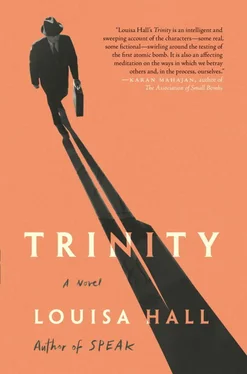WHAT I KNOW, FROM EYEWITNESS ACCOUNTS OF THE FINAL twenty-four hours, is this: on the afternoon of July 15, 1945, Robert Oppenheimer drives to the steel shot tower that rises one hundred feet from the desert.
He steps out of the jeep. The wind is blowing harder now, as Oppenheimer walks to the tower. He climbs one rung at a time, the warm metal pressing his palms. When he reaches the top, he pulls himself up to the platform and stands in the shack the technicians built: a roof and three corrugated metal walls, one open side facing west.
There, he inspects the device. In its cradle, it stands as tall as his head: a ten-thousand-pound metal capsule, looped and plugged with detonators. The first nuclear bomb. The work of the last three years of his life.
It’s Oppenheimer who managed to persuade General Groves to run a full-scale test of the weapon. Groves would have delivered the bombs without testing, on the basis of the theoretical group’s calculations. A test, Groves felt, was a waste of millions of dollars of plutonium that had taken the army years to extract.
But Oppenheimer refused. He wouldn’t deliver the bombs until they’d run a full test, on the grounds that though the calculations were in all likelihood correct, without an actual experiment, our knowledge of the weapon wasn’t complete yet.
Groves finally consented. The test site was chosen, the shot tower erected, and the test bomb, which Oppenheimer now inspects, assembled and hoisted up to the platform.
HOW LONG DOES OPPENHEIMER REMAIN THERE, ONE HUNDRED FEET over the desert, standing beside the assembled device? I can’t find any record. I know, however, from photographs, that he’s wearing his porkpie hat.
It’s the same hat he’s worn since he lived in Berkeley, in the small house on Shasta Road, where he later will say he was happy. It’s made of brown felt, broad brimmed and battered by use. And if he stands, and faces out the open side of the shack, he looks away from the Oscura mountains toward the Jornada del Muerto basin.
That’s what he must see: a vast expanse of cracked, reddish earth spreading toward the mountains on the horizon. Dry shrubs, rocky outcrops, the blades of an occasional yucca, and scattered bones bleached by decades of sunlight.
The wind, according to every account, has only continued to quicken. Now the clouds have grown dark. They pour over the mountains like smoke, and as they cross the sky, they drag their shadows over the snakeweed.
Testimonial 1
Sam Casal
San Francisco, 1943
I ONLY FOLLOWED HIM FOR TWO DAYS, IN JUNE OF 1943, SO I CAN’Tsay that I knew him. Not, at least, in any real sense.
But it’s true that I thought about him a lot. Even after he’d gone back to Los Alamos, when I was just tailing that girl. And even after the war had been won, and I’d left G-2 to start my own practice.
Even now, if I’m honest. Every once in a while, when I’m on my way home from the office, I still sometimes think about Opp and that girl having dinner.
On the train, swinging out over the bay, it can start to seem as if there must have been some clue I didn’t catch, when I was sitting there at the bar, watching them in the smudged mirror. An exchange between him and the girl. An expression I didn’t notice.
It’s possible for me to get so caught up in the details of that night that the real world—Joanne and the boys, their football games and the homework—can sometimes start to recede. It’s as if I’m on the same train, traveling over the same body of water, but it’s almost thirty years ago now, and I’m still with the counterintelligence office, tailing him for Communist contacts.
Then, once again, Opp is sitting a few seats ahead, shaking out the newspaper he bought at the station, and it’s my job to stay a few seats behind him.
I’ve missed my stop a few times. I’ve had to apologize when I got home, and explain to Joanne that I slept through the station. There she is, folding laundry, or cleaning up after dinner, and I’m running late because all these years later, Opp’s still shaking out that old paper.
It’s the definition of a cold case. A case I’m not even assigned to, and haven’t been for nearly three decades.
But even so, sometimes you can’t help reviewing the details. You examine the way she greeted him at the station. You look at the Mexican place where they chose to have dinner. You remember the song they got up to dance to, the run in her stocking, the way she led him into the restaurant.
I know it’s all useless. Once I looked long and hard at a girl’s face. She was my wife and she was sleeping beside me. In the darkness, I looked at her a long time, but another person is a mystery.
We lived together for nearly a year. In the mornings, I watched her pull on her socks. Her shoes were lined up on the floor of our closet. But I never did know her. I also never knew Opp, or Opp’s wife, much less that girl who danced with him at the Mexican restaurant.
It’s useless to go back now and try to understand what I couldn’t back then. For the most part I resist the temptation, and it only occurs to me in a few specific locations. When I’m on the train, for example. Or if I pass Montgomery Street. If I pause there and try to remember what it was like when Opp had gone back to Los Alamos, and I was just tailing the girl.
I stood in that yard across from her building. Every night, I waited there in the darkness, under that tree. Its leaves smelled bitter and dusty. I could never figure out why. I just waited there, looking up at the lights of that girl’s apartment.
By then, I was so tired I started to see things. Like the belly of that plane that passed by so slowly it didn’t even seem to be moving. I was sure it wouldn’t stay up. I thought it would drop straight out of the sky. I imagined running headfirst into the wreckage.
What a strange time that was. I’m glad it’s behind us. Now there’s no reason to think of it much. Only if I drive past Montgomery Street, or if I venture back to that Mexican restaurant, and pull open that heavy door, and step into that particular darkness.
Then, sometimes, I can start to suspect once again that maybe the whole series of unsolvable cases started because Opp and that girl went to eat there. Or because they danced to that song. Or because they drove home to her third-story apartment.
That’s what it seemed like at the time: that because I couldn’t understand Opp, I couldn’t trust myself to understand anyone or anything else. Because for reasons I couldn’t comprehend in that moment, Opp wasn’t content to stay where he was supposed to, at that camp in the desert, sleeping in the house we gave him to share with his wife, waking up early to look after those weapons.
Because he set off on that reckless escape from the mesa, and fled back to the city, where he took that girl to the Mexican restaurant.
I couldn’t understand why he did it. Or why he thought he could do it. He had agents on him at all times. There was a childishness to the whole thing, as though he thought that if he couldn’t see us, we couldn’t see him and catch what he was doing.
I just didn’t get it. It contributed to my sense that we were sliding into a new kind of chaos. As if Opp himself—coming back to the city, spending the night with that girl—had knocked the whole world off its axis.
Читать дальше













